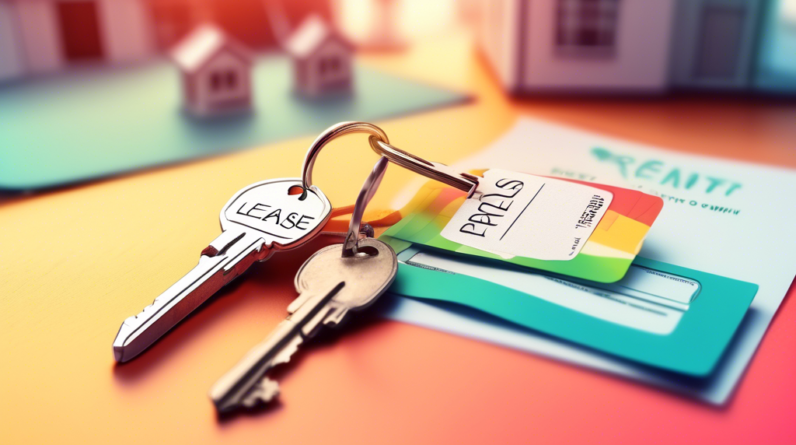
The dream of homeownership can feel out of reach for those with less-than-perfect credit. Traditional mortgage lenders often view low credit scores as a red flag, making loan approval difficult and potentially more expensive. But don’t despair! Rent-to-own agreements, also known as lease-to-own or lease-option agreements, offer an alternative route to owning a home, even with imperfect credit.
What is Rent-to-Own?
A rent-to-own agreement is a unique contract between a tenant and a landlord (who is also the seller) that combines renting with the option to buy the property later. Here’s how it generally works:
- Option Fee: You’ll pay the seller an upfront fee, often a percentage of the eventual purchase price, to secure the option to buy the property at a later date.
- Rent Payments: You’ll make regular rent payments, just like a traditional rental agreement. However, a portion of your rent payment may be credited towards the future purchase price of the home.
- Purchase Option: During the agreed-upon lease term, typically 1 to 3 years, you have the exclusive right, but not the obligation, to purchase the house at a predetermined price.
Benefits of Rent-to-Own for Buyers with Less-Than-Perfect Credit
Rent-to-own agreements offer several compelling advantages for individuals with credit challenges:
1. Time to Improve Your Credit Score
Securing a traditional mortgage with a low credit score can be a daunting task. Rent-to-own provides a valuable opportunity to improve your creditworthiness over time. As you consistently make on-time rent payments, you demonstrate financial responsibility, which can positively impact your credit score. Additionally, you can use this period to address any underlying credit issues, such as outstanding debts or errors on your credit report.
2. Easier Qualification Process
Unlike stringent mortgage applications, qualifying for a rent-to-own agreement is generally more lenient. While landlords may still conduct background and financial checks, the focus is often on your ability to make consistent rent payments, rather than solely on your credit score. This flexibility can be a lifeline for individuals who may not meet traditional lending criteria.
3. Lock in a Purchase Price
In a fluctuating real estate market, locking in a purchase price can provide significant financial security. Rent-to-own agreements typically establish a predetermined purchase price at the beginning of the lease term. This means you’re protected from potential price increases in the future, allowing you to budget effectively and avoid being priced out of your desired home.
4. Test Drive Before Buying
Purchasing a home is a major decision, and it’s not always easy to assess the true livability of a property during brief viewings. Rent-to-own provides a unique try before you buy advantage. You can experience the neighborhood, evaluate the condition of the home, and identify any potential hidden issues before committing to a purchase.
5. Build Equity Gradually
While not all rent-to-own agreements offer rent credit towards the purchase price, many do. This means that a portion of your monthly rent payment goes towards building equity in the property. Over time, these credits accumulate, reducing your eventual down payment and providing you with a financial head start towards homeownership.
Navigating Rent-to-Own Agreements: Important Considerations
While rent-to-own can be a viable path to homeownership, it’s essential to enter these agreements with a clear understanding of the terms and potential risks:
1. Thoroughly Review the Contract
Rent-to-own agreements are legally binding documents with long-term implications. It’s crucial to carefully review all terms and conditions with the assistance of a real estate attorney. Pay close attention to:
- Purchase price and option fee amount
- Rent credit arrangements (if any)
- Maintenance and repair responsibilities
- Early termination clauses
2. Understand the Risks
Rent-to-own involves inherent risks for both parties. If you default on rent payments or decide not to purchase the property, you could lose your option fee and any rent credits accumulated. Similarly, if the seller encounters financial difficulties or breaches the agreement, it could jeopardize your path to ownership.
3. Evaluate the Home’s Condition
Just like with a traditional home purchase, obtaining a professional home inspection is essential. This will help you identify any existing or potential problems with the property and ensure that you’re making a sound investment.
4. Seek Professional Guidance
Navigating the complexities of rent-to-own agreements can be challenging. Consulting with experienced real estate agents and attorneys specializing in these types of transactions is highly recommended. They can provide valuable insights, negotiate favorable terms on your behalf, and safeguard your interests throughout the process.
Conclusion
For individuals with less-than-perfect credit, rent-to-own agreements offer a potential pathway to achieving the dream of homeownership. By providing time to improve credit, offering a more accessible qualification process, and allowing you to lock in a purchase price, rent-to-own can be a valuable tool. However, it’s essential to approach these agreements with caution, carefully review all terms, and seek professional guidance to mitigate potential risks. With careful planning and due diligence, rent-to-own can be a stepping stone to securing a place to call your own.







